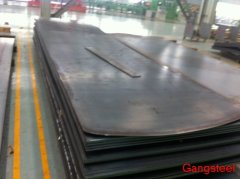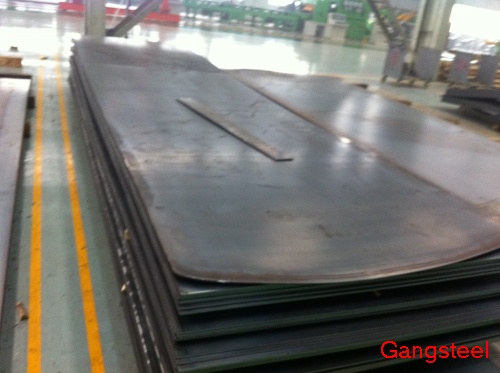Certificates
WYJ012-2001 SA387Gr11C12
1. The applicable scope
The technology conditions apply to more than 120 mm thick SA387Gr11C12 steel plates.
2. The size, shape, weight and allow deviation
The steel plate size and shape, weight and deviation should be allowed to meet the provisions of GB6654-1996 standard.
3. Technical requirements
3.1 chemical composition
The chemical composition of the steel plate should be in accordance with table 1.
Table 1 WT%
|
composition
|
C
|
Si*
|
Mn*
|
P
|
S
|
Cr
|
Mo
|
Ni
|
Cu
|
|
heat analysis
|
≤0.17
|
0.50~0.80
|
0.40~0.65
|
≤0.010
|
≤0.012
|
1.00~1.50
|
0.45~0.65
|
≤0.20
|
≤0.20
|
|
product analysis
|
≤0.17
|
0.44~0.86
|
0.35~0.73
|
≤0.012
|
≤0.015
|
0.94~1.56
|
0.40~0.70
|
≤0.25
|
≤0.20
|
|
composition
|
Sb**
|
Sn**
|
As**
|
(H)**
|
|
heat analysis
|
≤0.003
|
≤0.015
|
≤0.016
|
≤2PPm
|
|
product analysis
|
≤0.003
|
≤0.015
|
≤0.016
|
≤2PPm
|
Note: (1) * Si, Mn's content control it close to the lower limit of specified range ad far as possible..
(2) * * residual trace element analysis results only for record, does not make the acceptance conditions.
(3) finished product should be according to the analysis of each rolling a sampling inspection.
(4) the tempering embrittlement of full sensitivity (X) should meet the following requirements:
X=(10P+5Sb+4Sn+As)×10-2≤15PPm
(type of element are in PPm content generation, such as 0.01% to the 100 PPm generation into.)
3.2 delivery status: the steel plate tonormalized (allows cooling) + tempering state delivery (normalized temperature≤954 ℃temperature, tempering
Degrees≥630 ℃) frequency. According to the agreement between the supply and demand, hot forming steel plate can also annealing or high temperature tempering state delivery, but no matter what state delivery steel, steel mills of simulated sample must be billet after welding heat treatment.
3.3 mechanical properties
The mechanical properties of the steel plate should comply with the provisions of the table 2 (sample for simulation of heat treatment after welding state).
|
tensile strength
σb
MPa
|
yield pointσ0.2
MPa
|
elongation
δ5
%
|
cold bend inspection
180°
b=2a
|
+10℃AKV
(transverse)
J
|
reduction of areaψ
%
|
425℃
σ0.2
MPa
|
|
516-690
|
≥310
|
≥22
|
d=2a
|
≥54(average value)
≥48(single value)
|
≥45
|
≥220
|
Note: when doing impact test, shall be recorded lateral expansion value and fibrous fracture percentage for reference.


